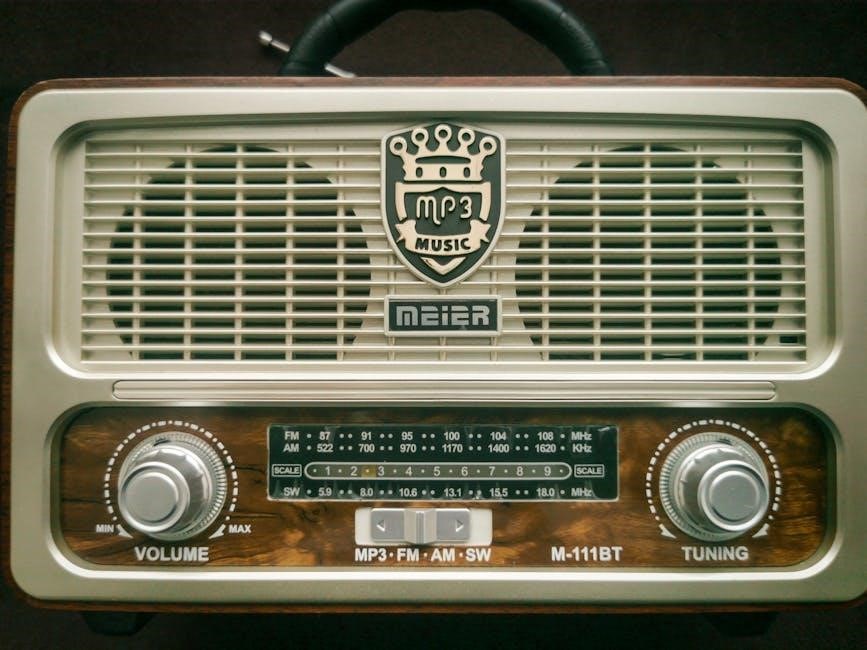Converting PDFs to MP3 involves transforming written content into audio files‚ enabling easy listening․ Tools like Python scripts and online converters are widely used for this purpose․ Many applications rely on such conversions‚ making them essential for modern workflows․ The process often requires only basic technical skills and offers numerous benefits․
What is MP3?
MP3‚ or MPEG-1 Audio Layer III‚ is a widely used digital audio format for storing and transmitting audio files․ It employs lossy compression‚ reducing file sizes without significantly affecting perceived audio quality․ Ideal for music‚ podcasts‚ and audiobooks‚ MP3 is compatible with most devices and software․ Its popularity stems from balancing file size and sound quality‚ making it a staple for audio sharing and playback․
What is PDF?
PDF‚ or Portable Document Format‚ is a widely used file format for sharing documents while ensuring consistent appearance across different platforms․ PDFs preserve layout‚ text‚ and images‚ making them ideal for sharing and printing․ They are often used to distribute reports‚ articles‚ and forms․ Additionally‚ PDFs serve as a source for creating MP3 audiobooks and other audio content‚ as they can be programmatically accessed to extract text for conversion into speech‚ enabling versatile applications beyond traditional document sharing․
Why Convert PDF to MP3?
Converting PDFs to MP3 offers several advantages‚ including the ability to listen to content hands-free while driving or exercising‚ accommodating individuals with visual impairments‚ and saving time by consuming information on the go․ Tools like Python scripts and online converters simplify the process using Text-to-Speech (TTS) technology․ This conversion can benefit businesses‚ educators‚ and creators by expanding content accessibility and reach․ MP3 files’ wide compatibility enhances portability across devices‚ while addressing challenges such as preserving formatting and ensuring legal compliance is crucial for optimal user experience․

Types of Tools for PDF to MP3 Conversion
PDF to MP3 conversion utilizes various tools‚ including online platforms‚ offline software‚ free and paid solutions‚ and mobile apps․ These tools cater to different needs‚ from quick online processing to advanced offline features․ Users can choose based on convenience‚ cost‚ and specific requirements for seamless PDF to MP3 transformations․
Online Tools
Online tools for PDF to MP3 conversion provide users with a convenient and accessible way to transform written content into audio files without requiring any software installations․ Examples of such tools include Smallpdf‚ ILovePDF‚ i2Audio‚ and PDFtoMP3Online․ These platforms offer user-friendly interfaces‚ making them ideal for individuals who prefer simplicity and ease of use․ Additionally‚ they are accessible from any device with internet connectivity‚ enhancing their versatility․
However‚ online tools may present limitations such as file size restrictions‚ which can be a hindrance when dealing with larger PDF documents․ Users should also be aware that conversion quality might vary compared to offline tools․ Furthermore‚ data security is a consideration when uploading files to third-party websites․ It is advisable to review the terms of service to understand data handling practices and any usage restrictions․ Exploring multiple options can help users find the tool that best meets their specific requirements․
Offline Tools
Offline tools for PDF to MP3 conversion provide a secure and private solution for transforming documents into audio files without relying on internet connectivity․ These tools‚ such as OCRmypdf and various PDF extractors‚ offer advanced customization and batch processing capabilities․ Users can benefit from enhanced privacy‚ as files remain on their local devices․ While offline tools often require initial setup and may demand more technical expertise‚ they provide unparalleled control over the conversion process․ These solutions are ideal for professionals and individuals prioritizing data security and flexibility․
Free Tools
Free tools for PDF to MP3 conversion offer a cost-effective way to transform documents into audio files․ Many platforms‚ such as PDFtoMP3Online Converter‚ provide seamless interfaces and quick results․ These tools are ideal for casual users and small-scale projects‚ ensuring accessibility without financial burden․ Free options often include essential features like text extraction and basic audio settings‚ making them a valuable resource for everyday use․
Paid Tools
Paid PDF to MP3 converters offer advanced features‚ including multi-format support and enhanced audio quality․ These tools ensure reliability and performance for professional users․ Popular options like i2Audio PDF to MP3 Converter and PDFtoMP3Online provide seamless integration with desktop and cloud systems․ Paid tools often include customer support and premium optimizations‚ making them ideal for frequent or complex conversion needs․ They may require a subscription or one-time purchase‚ offering value for serious users․
Mobile Apps
Mobile apps for PDF to MP3 conversion offer convenience and portability for users on the go․ These apps enable users to convert PDF files into audio format directly from their smartphones or tablets․ Popular tools like i2Audio and PDFtoMP3Online provide user-friendly interfaces for seamless mobile conversion․ Mobile apps often include features like offline access‚ syncing with cloud storage‚ and customizable audio settings․ They are ideal for professionals and students who need quick‚ reliable conversions while traveling or in the field․

Methods of Converting PDF to MP3
PDF to MP3 conversion can be achieved through online platforms‚ offline software‚ Python scripts‚ and text-to-speech APIs․ Users can choose from free or paid tools‚ while some rely on manual text extraction․ These methods offer flexibility‚ catering to both basic and advanced conversion needs․
Using Python Scripts
Python scripts provide a powerful way to convert PDFs to MP3 by automating text extraction and audio synthesis․ Tools like PyPDF2 and gtts enable developers to extract text from PDFs and convert it into speech seamlessly․ Scripts can be customized to handle multiple files or optimize audio for clarity and quality․ Python’s flexibility makes it an excellent choice for streamlined‚ automated conversions․
Using AI and Machine Learning
AI and ML revolutionize PDF to MP3 conversion by enhancing accuracy and efficiency․ Advanced OCR technologies extract text accurately‚ while NLP improves context understanding․ AI-powered text-to-speech models generate high-quality audio‚ adapting accents and languages seamlessly․ These innovations enable faster conversions with improved clarity‚ making complex PDF documents easily accessible as MP3 files․
Using PDF Extractors
PDF extractors are essential tools for converting PDFs to MP3․ These tools extract text from PDF files‚ often preserving formatting and structure․ Extracted data can then be converted to audio using text-to-speech software or APIs․ PDF extractors are especially useful for large documents or those with complex layouts․ They offer flexibility and precision‚ ensuring accurate conversion for various purposes‚ including audiobooks and accessible content․ Voice customization enhances user experience‚ making PDF extractors a cornerstone in modern conversion workflows․
Using Text-to-Speech APIs
Text-to-Speech (TTS) APIs convert extracted text from PDFs into spoken audio‚ enabling MP3 creation․ These APIs use advanced algorithms to synthesize natural-sounding voices‚ making the conversion process seamless․ Developers often integrate TTS APIs with PDF extractors for automated workflows․ Customization options include choosing voices‚ speeds‚ and pitches to meet specific needs․ TTS APIs enhance accessibility and are widely used for audiobooks‚ podcasts‚ and educational content․
Manual Conversion Techniques
Manual conversion of PDF to MP3 involves several steps․ Begin by extracting text from the PDF using a reader․ Then‚ manually clean and format the text in a word processor․ Next‚ use a text-to-speech tool to convert the text into audio․ Finally‚ save the audio as an MP3 file․ This approach offers full control over voice selection and audio settings‚ ensuring a customized result․ However‚ it is more time-consuming and requires technical skills․ Ideal for small-scale conversions or projects where automation isn’t desired․

Popular PDF to MP3 Converters
Popular PDF to MP3 converters include Smallpdf‚ i2Audio‚ PDFtoMP3Online‚ ILovePDF‚ and OCRmypdf․ These platforms offer efficient and user-friendly solutions for converting PDFs into high-quality MP3 files securely․
Smallpdf Converter
Smallpdf Converter is a popular tool for converting PDFs to MP3․ Its user-friendly interface supports drag-and-drop functionality‚ allowing for easy file uploads․ The converter offers high quality audio output in multiple formats‚ such as MP3 and WAV․ Smallpdf Converter is known for preserving text accuracy and maintaining file integrity during conversion․ It also provides customization options for audio settings‚ making it a versatile choice for users․
i2Audio PDF to MP3 Converter
i2Audio is a reliable tool for converting PDF documents into MP3 audio files․ It offers a seamless experience with its intuitive interface and efficient processing capabilities․ The converter supports various PDF formats and delivers high-quality audio output‚ making it ideal for creating audiobooks or educational materials․ With features like adjustable speed and pitch settings‚ it ensures a personalized listening experience while maintaining text accuracy and clarity․
PDFtoMP3Online Converter
PDFtoMP3Online Converter is a popular tool for converting PDF files into MP3 audio format․ It offers a user-friendly interface and supports various PDF documents‚ ensuring high-quality audio output; The converter is free to use‚ making it accessible for individuals and businesses alike․ With its efficient processing and customization options‚ it simplifies the creation of audiobooks or podcasts from written content․ The tool is perfect for those seeking a reliable and convenient solution for PDF-to-MP3 conversion․
ILovePDF Converter
ILovePDF Converter is a versatile tool designed for seamless PDF-to-MP3 conversions․ It offers a user-friendly interface‚ making it accessible for users of all skill levels․ The converter supports multiple PDF formats and produces high-quality MP3 audio files․ With ILovePDF‚ you can easily extract text from PDFs and create audiobooks or audio content․ Its popularity lies in its simplicity‚ efficiency‚ and ability to handle large files effortlessly‚ making it a reliable choice for converting PDFs to MP3 format․
OCRmypdf
OCRmypdf is a powerful tool for extracting text from scanned PDFs‚ enhancing their compatibility for further conversions․ By employing optical character recognition‚ it transforms image-based PDFs into searchable documents with selectable text․ This functionality is essential for preparing PDFs for text-to-speech conversion into MP3 format․ It simplifies the process of converting scanned materials into accessible audio content‚ making it a valuable asset in digitizing and sharing information․

Applications of MP3 and PDF Files
MP3 files are ideal for audiobooks‚ podcasts‚ and music‚ while PDFs excel in distributing documents for education‚ research‚ and business․ Together‚ they enhance learning‚ entertainment‚ and professional communication‚ offering versatile solutions for modern needs․
Educational Use
PDF to MP3 conversion enhances learning by providing audio versions of textbooks and articles‚ ideal for auditory learners or those with visual impairments․ MP3s enable students to study on the go‚ making education more flexible and accessible․ This conversion also caters to language learners‚ offering opportunities to practice listening skills․ Teachers can use audio versions to supplement lessons‚ while parents can assist children with homework by listening to materials․ Versatile and adaptable‚ MP3s support diverse educational needs‚ promoting inclusivity and engagement․
Entertainment Use
PDF to MP3 conversion allows users to transform documents into audio files‚perfect for entertainment․ Audiobooks‚for instance‚have gained popularity as people seek convenient ways to enjoy stories on the go․ MP3 files offer portable and versatile entertainment options‚ ideal for long journeys or multitasking․ This conversion also brings unique value to fans of comics‚novels‚and other media‚offering engaging alternatives to traditional reading․ With the rise of digital platforms‚PDF to MP3 tools are becoming indispensable for audiobook enthusiasts․
Accessibility Use
PDF to MP3 conversion empowers individuals with visual impairments or reading difficulties by transforming written content into accessible audio formats․ Text-to-speech technologies‚ like Python scripts‚ enable seamless accessibility for educational materials‚ reports‚ and manuals․ MP3 files allow users to listen to content on devices‚ enhancing independence and inclusivity․ This conversion bridges gaps in accessibility‚ making information reachable for diverse audiences who rely on audio formats․
Business Use
MP3 and PDF formats serve crucial roles in business communication and operations․ PDFs are ideal for distributing professional‚ secure documents like contracts‚ reports‚ and training materials․ Converting PDFs to MP3s allows businesses to create audio versions for podcasts‚ training sessions‚ or audiobooks‚ enhancing accessibility and convenience․ MP3s enable content consumption through listening‚ catering to different learning preferences and improving content retention․ Integrating both formats ensures flexibility and caters to diverse audiences‚ aligning with modern business communication strategies․

Limitations of Converting PDF to MP3
Converting PDF to MP3 presents several limitations that must be considered․ Firstly‚ PDFs are text-based‚ while MP3s are audio-based‚ leading to potential loss of visual information such as images‚ which are not effectively translated into audio․ Additionally‚ complex PDF layouts‚ including tables and charts‚ may lose their formatting‚ reducing the richness of the listener experience․ OCR errors can occur‚ especially with low-quality text‚ leading to inaccuracies in the audio output․ Legal issues‚ such as copyright infringement‚ may arise if converting protected content without permission․ Furthermore‚ the availability of reliable‚ free tools and the technical expertise required to use conversion software can be barriers․ Lastly‚ storage requirements and conversion time‚ especially for large PDFs‚ should be taken into account․ Evaluating these factors is crucial to ensure the conversion meets the intended purpose effectively․
Loss of File Quality
When converting PDFs to MP3 files‚ several factors can lead to a loss of file quality․ First‚ the structural integrity of the text and formatting may be compromised due to the translation process from a visual document format to an audio file․ Fonts‚ colors‚ and layouts specific to PDFs are not preserved in MP3‚ resulting in a lack of visual context․
Additionally‚ the conversion typically involves text-to-speech synthesis‚ which may not perfectly replicate the nuances of the original document․ This can lead to potential inaccuracies or misinterpretations of the content‚ especially in complex or heavily formatted PDFs․
Moreover‚ the conversion from text to audio inherently involves compression‚ further affecting the quality of the resulting MP3 file․ This compression can lead to the loss of certain details and the introduction of artifacts‚ making the final audio less faithful to the original document․
Overall‚ these limitations can result in an MP3 file that‚ while containing the same basic information as the PDF‚ lacks the visual and structural elements that make the original document clear and engaging․
Formatting Issues
Converting PDFs to MP3 involves translating text into audio‚ which often disrupts the original formatting; PDFs use various fonts‚ styles‚ and layouts that may not be accurately represented in MP3․ Bold text‚ italics‚ or special fonts in a PDF might not change the tone or emphasis in the resulting audio․ Complex layouts‚ such as multiple columns or images‚ can lead to incoherent audio as these elements may not be adequately described or may be skipped altogether․ Special characters‚ symbols‚ or mathematical equations may be misread or lost in translation․ Additionally‚ the sequential nature of audio can disrupt the flow of text from the PDF‚ potentially making the MP3 harder to follow․ These issues highlight the challenges in preserving the original structure and emphasis when converting PDFs to MP3․
File Size Constraints
Converting PDFs to MP3s involves significant changes in file size due to the nature of the formats․ PDFs‚ as document files‚ can vary in size depending on their content‚ such as text‚ images‚ or encoded data‚ which do not directly translate into MP3 audio sizes․ The length of the document greatly impacts the MP3 file size‚ as extended audio durations necessitate larger files․
When converting‚ certain elements like images in the PDF may be omitted‚ reducing the MP3 file size․ The quality settings‚ such as bit rate‚ also play a crucial role: higher bit rates enhance audio quality but increase file size‚ while lower bit rates reduce size at the cost of quality․
Tools may offer options to split MP3 files into smaller parts to manage size constraints‚ which is especially useful for large PDFs or lengthy audio content․ Additionally‚ the absence of direct correlation between the original PDF’s size and the resulting MP3’s size underscores the importance of customizing conversion settings to balance quality and manageability․
Software Limitations in PDF to MP3 Conversion
The conversion from PDF to MP3 involves several inherent software limitations that can affect the outcome of the process․
Text Extraction Challenges: Many PDFs contain complex formatting‚ images‚ or embedded fonts that can make text extraction difficult․ This can result in inaccuracies or omissions in the translated audio‚ reducing the quality of the final MP3․
Voice and Language Constraints: Text-to-speech converters often have limitations in terms of supported languages and the naturalness of the voice output․ This can limit the utility of the converted audio for multilingual or nuanced content․
Error Susceptibility: The conversion process is prone to errors‚ especially with corrupted or poorly formatted PDFs․ This can lead to skips‚ distortions‚ or incomplete audio files‚ detracting from the user experience․
Resource Intensive: High-quality conversion often requires significant processing power and memory‚ which can be a barrier for users with limited computational resources or older devices․
Inability to Reproduce Non-Text Elements: PDFs frequently include elements such as tables‚ charts‚ and images that cannot be meaningfully converted into audio․ These elements may be omitted or poorly represented‚ leading to a loss of information in the final product․

Best Practices for PDF to MP3 Conversion
Ensure PDFs are clean and formatted for effective text extraction․ Use reliable conversion tools and choose appropriate audio settings for quality and compatibility․ Test outputs for clarity and organize files efficiently to maintain accessibility and usability across devices and applications․
Text Extraction Tips
To ensure accurate text extraction from PDFs‚ use high-quality PDF files with clear fonts and layouts․ Avoid scanned PDFs or images‚ as they can cause errors․ Utilize OCR tools if text is scanned or distorted․ Remove or simplify complex formatting‚ and ensure text is selectable․ Test extraction on small sections before full conversion to identify and fix any issues․ Proofread extracted text for accuracy and completeness․
Audio Quality Settings
When converting PDFs to MP3‚ prioritize audio clarity and fidelity․ Adjust sample rates and bitrates to balance file size and sound quality․ Use high-quality text-to-speech voices and enable advanced voice settings․ Experiment with pitch‚ speed‚ and volume to enhance readability․ Consider compression levels to optimize file size without compromising quality․ Ensure compatibility with playback devices by selecting the right format and settings․ Test outputs to ensure accuracy and adjust as needed for your specific use case․
File Splitting and Merging
Organizing PDFs into smaller sections before conversion streamlines MP3 creation․ Use tools that allow splitting PDFs into chapters or pages‚ ensuring manageable audio files․ Merge related MP3s to create cohesive audiobooks or presentations․ This approach enhances accessibility and simplifies navigation․ Always ensure files are correctly labeled and ordered․ Advanced tools enable custom settings for seamless merging‚ improving workflow efficiency and user experience․ Test smaller files to avoid errors and optimize for playback devices․ Proper splitting and merging maintain file integrity and compatibility․
Organizing Converted Files
Organizing MP3 files is crucial and involves naming conventions‚ folder structure‚ metadata tagging‚ and workflow organization․
Adopt descriptive naming conventions for clarity‚ such as including content summaries or page numbers‚ to easily identify each file without confusion․

Create a well-organized folder structure to keep related MP3s together‚ helping to maintain a clear and accessible system for future reference․
Utilize metadata tagging to enhance searchability and organization by adding details such as artist‚ album‚ and title to your files․
Adopt a consistent workflow for converting and managing your MP3 files to ensure efficiency and ease of use‚ preventing clutter and disarray․

Case Studies of PDF to MP3 Conversion
Case studies demonstrate practical applications of PDF to MP3 conversion in enhancing accessibility․ Examples include transforming educational materials into audiobooks or simplifying dense reports into easy-to-consume audio formats․
Example 1: Converting a Research Paper
Converting a research paper to MP3 enables auditory learning and multitasking․ By extracting text from the PDF and using a text-to-speech API or Python script‚ individuals can listen to complex content on the go․ This method is particularly beneficial for students or professionals seeking to digest dense material efficiently while commuting or working out; It enhances accessibility and improves information retention․
Example 2: Creating Audiobooks
Creating audiobooks from PDFs allows authors and publishers to reach wider audiences․ Using tools like Python scripts and text-to-speech APIs‚ PDF content can be converted into engaging MP3 formats․ This method is ideal for enhancing accessibility and convenience‚ enabling listeners to enjoy stories or educational materials on the go․ Audiobooks provide flexibility in consuming content‚ making them a popular choice in today’s fast-paced world․
Example 3: Converting Manuals and Guides
Converting PDF manuals and guides to MP3 offers practical advantages for users․ Professionals can easily access training materials or reference documents on-the-go by listening to them․ This method enhances accessibility‚ accommodating diverse learning styles․ MP3 versions maintain the structure of the original content while providing flexibility․ Tools like Python scripts and online converters simplify the process‚ making it a valuable solution for educational and professional purposes․
Common Issues and Troubleshooting
PDF to MP3 conversion often faces challenges like file corruption‚ formatting errors‚ or incompatible software․ Troubleshooting involves checking file integrity‚ verifying conversion settings‚ and ensuring software compatibility․ Resolving these issues ensures smooth audio generation from PDF content․
Slow Conversion Speed
Converting PDFs to MP3 can be frustratingly slow due to several factors․ Heavy CPU or memory usage by conversion software can bog down your computer․ Large PDF files or complex content with images and formatting may also prolong the process․ Additionally‚ using online tools can introduce delays due to uploading and downloading‚ especially with poor internet connections․ Scripts and text-to-speech engines differ in efficiency‚ affecting speed․ Hardware limitations on older systems contribute to slowdowns‚ while inefficient settings or multitasking with other applications can further degrade performance․ To optimize‚ consider upgrading hardware‚ refining software settings‚ or using offline tools for faster processing․ Exploring user forums and optimizing scripts or APIs can also help enhance conversion efficiency․ Upgrading to paid software or consulting community solutions may offer additional solutions․ Addressing these factors can significantly improve conversion speeds‚ making the process more efficient and user-friendly․
Text Formatting Loss
Text formatting loss in PDF to MP3 conversions is a common challenge․ PDF files often contain elements such as bold text‚ italics‚ tables‚ images‚ headers‚ and footers‚ which do not convert effectively into audio format․ During conversion‚ these visual elements may be skipped or misrepresented‚ resulting in a loss of context or critical data in the audiobook․ Special fonts‚ text arrangements‚ and characters can also fail to translate accurately‚ leading to inaccuracies․ To mitigate this‚ users can employ higher-quality conversion tools‚ adjust text manually before conversion‚ or set appropriate settings to preserve essential formatting․ Understanding these limitations helps users manage expectations and select suitable methods for their needs‚ ensuring a more coherent and accurate audio output despite inherent challenges․

Advanced PDF to MP3 Conversion Techniques
Advanced PDF to MP3 conversion often involves command-line tools‚ batch processing‚ and custom audio settings․ Techniques like OCR enhancement and AI-driven text extraction improve accuracy․ Customizable voice settings and offline conversion methods provide greater control over the output quality․ These advanced methods cater to professional and specialized use cases‚ ensuring high-fidelity results․
